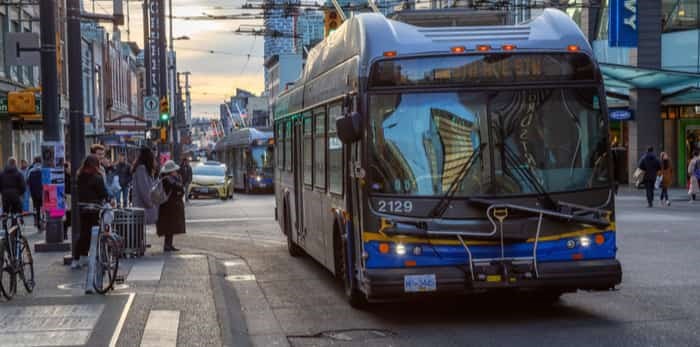This fall, the City of Vancouver is partnering with Translink to pilot bus-priority measures on corridors with the worst bus delays.
In a statement, the City says the project follows several successful road-reallocation initiatives aimed at supporting residents and businesses during the pandemic.
“It’s critical people have efficient options for getting around the city as the economy recovers,” says Lon LaClaire, General Manager of Engineering Services.
“These measures will help ensure transit remains a good option for the tens of thousands of people who use Vancouver buses every day to get to their jobs and to access businesses and essential services. By ensuring transit remains a reliable option, we can better manage road congestion at a time when supporting the movement of people and goods has never been more important.”
With funding from TransLink, bus-priority measures will be implemented by the City on four key corridors that have had some of the region’s worst bus delays for several years. The corridors include Granville Street, Robson Street, Main Street and Kingsway, and 49th Avenue.
The low-impact, temporary measures include:
- Extending sidewalks/curbs at bus stops to reduce the need for buses to merge in and out of traffic, increasing
sidewalk space and freeing up curb space for more parking. - Small changes at intersections to reduce delays to buses and other vehicles.
- Creating bus lanes to give priority to buses over regular traffic, parking and curbside access.
“These are some of the many important changes to transit that our regular riders will see as they continue to return to the system,” says Kevin Desmond, CEO of TransLink. “In collaboration with residents, businesses and community stakeholders, these bus priority initiatives will help improve the reliability of buses, support economic recovery and give transit and our cities the best chance of thriving.”
The bus-priority projects are the latest measure the City is taking to lessen the impact of the pandemic on residents and businesses. Previous road-reallocation projects include:
- Patios: Fast-tracking the permitting process so restaurants can build outdoor patios and extending permits beyond Oct. 31.
- Public plazas: Creating outdoor seating areas for people to rest, eat and visit.
- Room to Move: Turning select residential streets into Slow Streets by allowing local traffic only to create space for people walking and biking. Converting eastbound lanes on Beach Avenue to a biking and walking path.
- Room to Queue: Widening sidewalks for queuing at businesses by repurposing curb lanes.
- Room to Load: Creating short-term loading/pick-up zones near businesses with high turnover and increased curbside needs.
Many cities across North America are rolling out bus-priority measures to improve trip times for customers to ensure bus travel remains a reliable option for residents. Vancouver’s pilot will run for a year so staff can monitor the impacts and benefits, and collect feedback from citizens and businesses, before making decisions about possible permanent changes.



